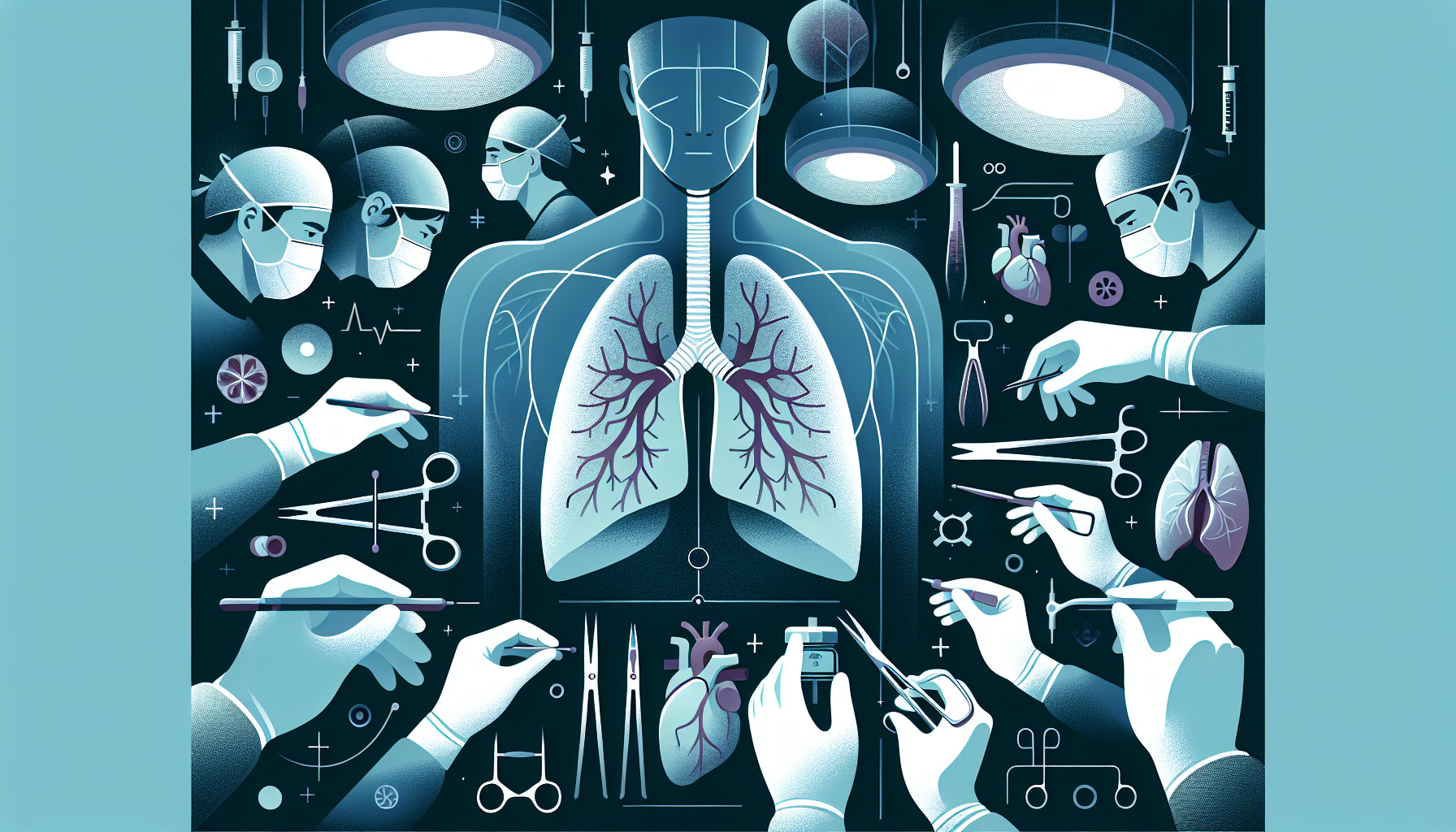Our Summary
This research paper discusses the long-term problems that can occur after a lung transplant, focusing on a condition known as chronic lung allograft dysfunction (CLAD). Over the past few decades, researchers have found that a type of rejection called antibody-mediated rejection (AMR) can increase the risk of developing CLAD. This is a particular issue for patients who already have certain antibodies (known as HLA antibodies) before their transplant - these patients are said to be “sensitized”. These sensitized patients may be more likely to experience AMR, leading to CLAD and a higher risk of death after the transplant. The paper discusses how patients become sensitized, the impact this can have on lung transplants, and potential strategies for managing the problem.
FAQs
- What is chronic lung allograft dysfunction (CLAD) and how does it affect long term outcomes in lung transplant?
- How does the presence of HLA antibodies in lung transplant candidates increase the risk for AMR and CLAD?
- What are the potential management strategies for sensitized patients who have undergone a lung transplant?
Doctor’s Tip
One helpful tip a doctor might tell a patient about lung transplant is to closely follow their prescribed immunosuppressive medication regimen to help prevent antibody-mediated rejection and improve long-term outcomes. It is important for patients to adhere to their medication schedule, attend all follow-up appointments, and communicate any changes in their health or symptoms to their healthcare team. Additionally, practicing good overall health habits such as maintaining a healthy diet, staying physically active, and avoiding exposure to tobacco smoke can also help support a successful lung transplant outcome.
Suitable For
Patients who are typically recommended for lung transplant include those with end-stage lung disease, such as cystic fibrosis, chronic obstructive pulmonary disease (COPD), idiopathic pulmonary fibrosis, pulmonary hypertension, and other severe lung diseases. These patients often have significantly impaired lung function and quality of life, despite optimal medical management. Additionally, patients who have failed other treatments, such as medications or oxygen therapy, may be considered for lung transplant.
In particular, patients who are sensitized to HLA antibodies may be at higher risk for complications after lung transplant, including AMR, CLAD, and higher mortality. These sensitized patients may have a history of previous transplants, blood transfusions, pregnancies, or prior exposure to foreign antigens, which can lead to the development of HLA antibodies. Identifying and addressing these antibodies prior to transplant can help improve outcomes and reduce the risk of complications.
Overall, lung transplant is typically recommended for patients with end-stage lung disease who have exhausted other treatment options and have a high likelihood of benefiting from a transplant. It is important for patients to undergo a thorough evaluation by a multidisciplinary transplant team to determine if they are suitable candidates for transplant and to discuss the potential risks and benefits of the procedure.
Timeline
Before lung transplant:
- Patient is diagnosed with end-stage lung disease and is evaluated by a transplant center.
- Patient undergoes extensive medical and psychological evaluation to determine eligibility for transplant.
- Patient is placed on the transplant waiting list and awaits a suitable donor match.
- Patient may experience worsening symptoms and decreased lung function while waiting for a transplant.
After lung transplant:
- Patient undergoes surgery to receive the new lung(s).
- Patient is closely monitored in the hospital for complications and signs of rejection.
- Patient begins a lifelong regimen of immunosuppressive medications to prevent rejection.
- Patient undergoes regular follow-up appointments and tests to monitor lung function and overall health.
- Patient may experience complications such as infection, rejection, or side effects from medications.
- Patient gradually improves in lung function and quality of life, but may still face challenges related to the transplant.
Overall, the lung transplant process is a complex and challenging journey for patients, but can ultimately provide a new lease on life for those with end-stage lung disease.
What to Ask Your Doctor
- What is the process for evaluating my eligibility for a lung transplant?
- How will my sensitization status impact my candidacy for a lung transplant?
- What are the potential risks and complications associated with lung transplantation in sensitized patients?
- How will my sensitization status affect the likelihood of developing antibody-mediated rejection (AMR) or chronic lung allograft dysfunction (CLAD) post-transplant?
- What screening tests will be done to assess my HLA antibody status before and after transplant?
- What strategies will be used to manage and reduce the risk of AMR and CLAD in sensitized patients?
- How will my immunosuppressive medication regimen be tailored to address my sensitization status?
- What long-term monitoring and follow-up care will be necessary to monitor for complications related to sensitization after transplant?
- What are the potential outcomes and prognosis for sensitized patients undergoing lung transplant?
- Are there any research studies or clinical trials available that focus specifically on sensitized patients in lung transplant?
Reference
Authors: Young KA, Ali HA, Beermann KJ, Reynolds JM, Snyder LD. Journal: Front Immunol. 2021 May 26;12:689420. doi: 10.3389/fimmu.2021.689420. eCollection 2021. PMID: 34122454
